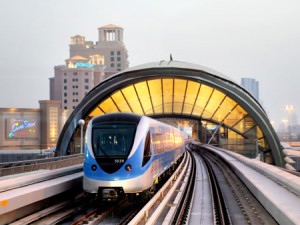By Nasser Saidi and Fabio Scacciavillani www.business24-7.ae
On the momentous date of 09.09.09 Dubai will be initiating a global milestone, Dubai Metro, which when completed in 2014 will include some 318km Metro network, stations, depots and parking areas.
 This is the first major new railroad infrastructure in the Arabian Peninsula in several decades and the only urban mass transit system. It is another sign that Dubai is achieving world class status in urban planning and quality of living. While the technological achievement of a fully automated metro is impressive, the economic benefits and consequences will be profound. Massive public investments in infrastructure represent the cornerstone of Dubai’s development strategy as envisioned by its leadership. These have included transportation systems (highways, roads, airports, ports and waterways), utilities (water, desalination, waste management, electricity and telecommunications) and other kinds of public facilities (schools, universities, post offices and media).
This is the first major new railroad infrastructure in the Arabian Peninsula in several decades and the only urban mass transit system. It is another sign that Dubai is achieving world class status in urban planning and quality of living. While the technological achievement of a fully automated metro is impressive, the economic benefits and consequences will be profound. Massive public investments in infrastructure represent the cornerstone of Dubai’s development strategy as envisioned by its leadership. These have included transportation systems (highways, roads, airports, ports and waterways), utilities (water, desalination, waste management, electricity and telecommunications) and other kinds of public facilities (schools, universities, post offices and media).
These infrastructure investments have provided a powerful thrust to economic growth and sparked off deep structural changes in Dubai’s economy, leading to one of the most amazing and fast process of economic diversification recorded in the world history. Dependence on oil and traditional commerce gave way to a modern service economy hinging on global logistics, tourism, IT, telecommuni-cations and finance. Without the enormous effort in endowing Dubai with state-of-the-art infrastructure, the human capital attracted to the emirate from all over the world would not have been used to its full extent. Infrastructure, in fact, generates positive network effects, the critical ingredient in high value-added sectors where cross fertilisation and synergic interactions are key elements of the competitive advantage.
Public spending on infrastructure produces positive economic returns: the larger the stock of publicly owned capital, the greater the overall productive capacity of the economy, i.e. its ability and efficiency in producing goods and services. In addition, a higher endowment of infrastructure boosts the aggregate return on private sector capital investments. The bottom line is that well-designed, business- oriented infrastructure is both directly productive, benefiting the economy by reducing the cost of private business transactions, and is an asset for the future productivity of the private sector. Empirical research suggests that the payoff on public infrastructure can vary substantially over time and across sectors. First of all, it depends on the usefulness of the investments themselves and the extent to which the spending “crowds out” or reduces the funding available for investment in private capital. Second, returns on the initial phase of a system of public investments can be large, but the growth rate declines as the system expands.
Empirical analysis shows that for emerging economies one per cent increase in the stock of “core infrastructure” – transportation and water supply, wastew- ater treatment and power facilities – is associated with an increase in the level of national output of between 0.15 and 0.25 per cent. Since national output is about four times the value of core infrastructure, a Dh100 infrastructure investment can generate an increase in output of between Dh60 and Dh100 within a year. In the case of Dubai Metro, the capital investment of Dh28 billion through 2014 will likely lead to an increase in national output of between Dh17bn and Dh28bn.
What sort of benefits can we expect from Dubai Metro? We can expect an increase in productivity as a result of lower congestion costs (variously estimated at between Dh4bn and Dh5bn per year), a positive externality in terms of reduced road use which, pushed up by population pressure, is causing bottlenecks, accidents, and inefficiency. While the introduction of the Salik toll system – a form of congestion pricing – led to more rational use of Sheikh Zayed Road, the introduction of the Dubai Metro network will provide an alternative to road transportation, helping reduce congestion, pollution and environmental damage resulting from road transport. Dubai Metro will also increase population and labour mobility by lowering the cost of travel and facilitating movement between different sectors of the city. An additional benefit of Dubai Metro will result from the greater integration of various transport networks, road, rail, water and air, facilitating the movement of people and goods. Inter-connected networks increase the overall value and effectiveness of independent networks.
In essence, the metro will substantially cut travel costs for lower and middle income people, expanding their ability not only to take jobs far from their dwellings, but also to enjoy the amenities of the city and its social life.
Investment in infrastructure has been the major driver of Dubai’s spectacular economic growth over the past decade. Dubai’s central geographic location between Asia and Europe became a source of economic comparative advantage as a result of the infrastructure investment that made Dubai, its people, activities and businesses internationally connected. Network externalities are obvious when we think of telecom and the internet: the more people ‘connected’ the greater the value of service. The same is true of transport systems, electricity grids, central cooling networks, water and waste management. Dubai Metro will lower the cost of transport, create a more environmentally friendly means of transport, increase national output and productivity growth and lead to a more socially integrated city.
– Nasser Saidi is Chief Economist and Fabio Scacciavillani Director Macroeconomics and Statistics at DIFC
















